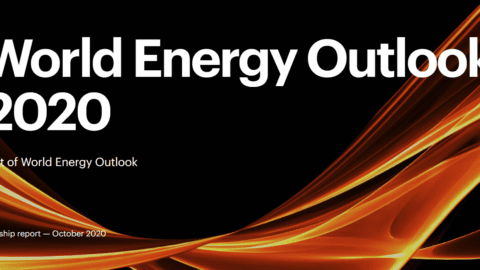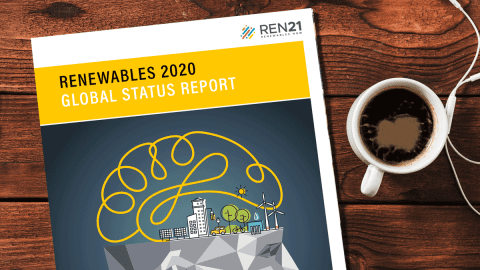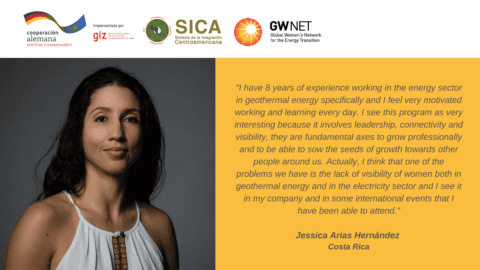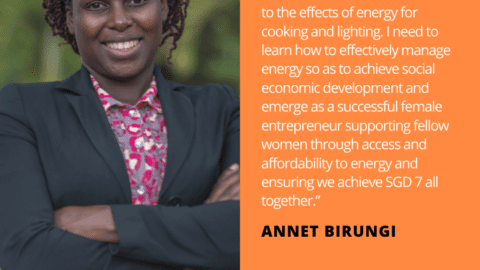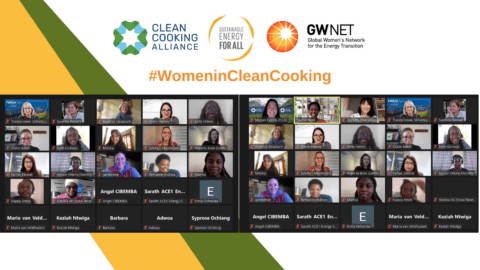The Women in Energy Storage Mentoring Programme sat down with Sandra Chavez, one of this year’s mentors, to chat about her journey in renewable energy and the challenges and opportunities in the energy storage sector. Sandra is a renewable energy engineer from Mexico. She has worked at the intersection of international development and the cleantech sector for around a decade. Currently, she is a consultant at the World Bank’s Energy Management Assistance Program where she helps deploy solar energy and energy storage solutions in developing countries.
1. Tell us a little about yourself. What do you love most about what you do?
Energy is a critical piece for human development, and renewable energy technologies can help ensure access to affordable, reliable, sustainable and modern energy for the hundreds of millions still lacking electricity and the many suffering from insufficient or unreliable power.
I love using innovative energy technologies, such as energy storage, to help improve people’s lives. I am very passionate about working with developing countries to harness their local energy resources and help accelerate the transition of the energy system to a more sustainable, distributed and equal one. In particular, energy storage has come a long way in the last decade and it is seeing an extraordinary scale up.
2. What were your goals when you started working in energy storage? Have these evolved?
Energy storage has been of great interest to me for almost a decade. During my graduate studies, I quickly became fascinated by how energy storage combined chemistry, electricity, mechanical and other principles. Beyond the technology, I also dove in the application of battery charging stations for rural communities, for my thesis in Mozambique.
I feel privileged to be working in this sector, it is a quickly evolving field. Today, as power systems feature higher and higher shares of renewable energy, there is an increasing need to add energy storage as a source of flexibility. My work now focuses on working with developing countries to deploy a wide range of storage technologies in the grid (both utility-scale and distributed).
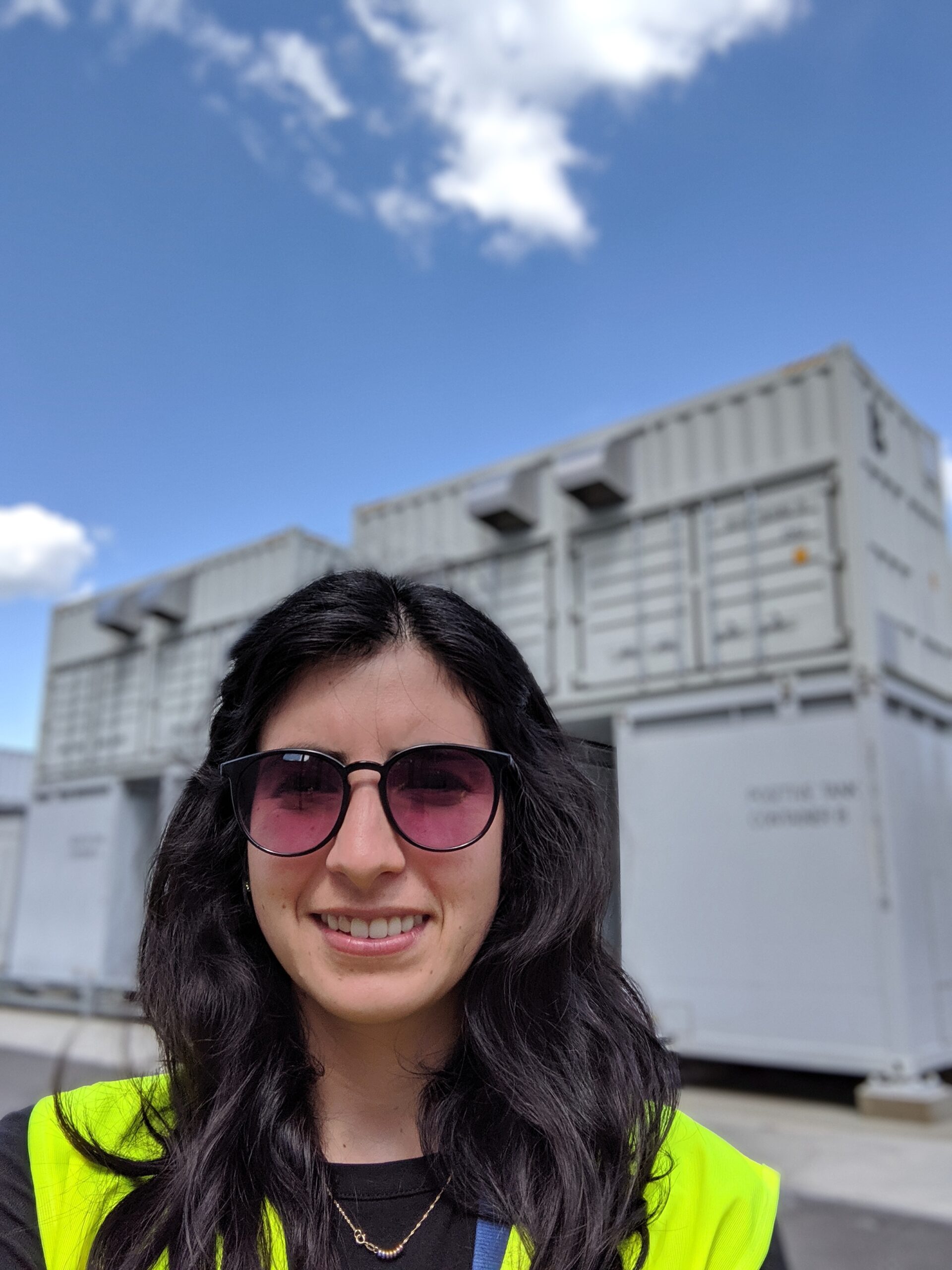
3. How has the COVID-19 pandemic impacted the professional goals you set out for the year?
Energy storage plays an important role in times of crisis. Energy storage contributes to increased resiliency of power critical infrastructure such as health facilities. I was shocked to learn that in sub-Saharan Africa, only 28% of healthcare facilities enjoy reliable electricity supply.
Additionally, the COVID-19 vaccine will require cold-chains beyond the current capacities in some developing countries. Innovations in energy storage could play a role in providing more reliable electricity, by coupling the power and cooling sectors (power to cool), or by using phase change materials.
My work and professional goals have remained the same, but I feel an extra motivation to help rebuild the energy sector in a more sustainable way and impact the lives of many.
4. What are the opportunities for energy storage growth in your country?
Hybridization of renewable energy and energy storage is a key opportunity, in my opinion. As energy storage costs continue to drop, following a similar downward trend as renewable energy, new hybrid plants can provide zero-carbon firm electricity that can be injected to the grid when it is needed the most.
Another exciting area is the replacement of diesel generators. Batteries charged by renewable energy resources can provide great resiliency to remote locations, in a cost-effective way. For example, extreme weather events are becoming more frequent and batteries can serve as a backup electricity supply in the case of disruptions to the electricity supply.
5. What challenges have you faced in the sector? Can you tell us how you overcame (or are overcoming) this challenge(s)?
I’ve been always very curious; science classes were my favorite in school. Deciding to study engineering, the first one in my family, was an easy decision and I excelled at my classes. Once I entered the workforce the inequalities started and I’ve had to face gender biases and stereotypes. I had to fight with biases of technical tasks being men’s work and more administrative tasks being women’s work. Also, I had to constantly establish my credibility – I do it by updating my technical knowledge and skills. Continuous learning, both soft and technical skills, are helping overcome and hopefully improve the gender inequalities that women face in the energy sector.
Sharing with other women and discovering that I am not the only one working to overcome these challenges, has been very empowering. Programs like this one and other women networks are a wonderful source of inspiration. I aspire to learn from gender experts on the actions that I can take to address gender biases when I see them for myself or others. Diversity will ultimately benefit us all, and the energy storage sector can not afford to leave women, people from developing countries, or anyone else behind.
6. Why did you join the Women in Energy Storage Mentorship Programme? What do you hope to achieve?
I joined the WES program because of the wonderful opportunity to learn from passionate emerging female leaders in the energy storage space and to further build my professional network. Being a mentor is a very rewarding process, where I get to learn so much. I feel honored to be able to collaborate with young women to advance their careers in the energy storage sector.
Timing for this program was very exciting, energy storage is a new and fast-growing industry in many developing countries. Thus, we have a unique opportunity to champion gender equality before gender norms are established. I’ve seen the wonderful job that other more mature renewable energy industries have done (wind, solar, geothermal).
7. What advice would you give to women hoping to join the energy storage sector?
The fast growth of the energy storage sector opens up opportunities for experts working in different topics, from R&D, manufacturing, project development, finance, regulations, capacity building, and many more. My advice is to find an area of interest and follow it thoroughly. Read new reports, news, conferences – there is a wealth of information to become a subject matter expert (particularly now that most events are online and more virtual content is available).
There is so much happening in the sector and more experts are needed help tackle the technical, operational and commercial challenges for the sustainable deployment of energy storage. Don’t be afraid to share your opinions and reflections, they are very valuable to speeding up the deployment of energy storage. The sector needs many more subject matter experts, and that can be you!
Become a mentor – what’s in it for you?
GWNET is looking for senior professionals who are eager to make a difference and have a positive impact on a younger woman’s career in the energy sector. With the ever-changing dynamics of the business fields, digitalisation, knowledge and knowledge sharing has become more important than ever. As a mentor, you get the opportunity to give something valuable back to more junior professionals and to expand your own knowledge through your mentees’ perspective. Mentoring will contribute to personal and professional development for both you and your mentee, as well as, shaping the direction of future generations within your field of expertise.
If you are interested in volunteering as a mentor in one of GWNET’s mentoring programmes (which involves approx. 1 – 1.5 hours of engagement per month plus optional participation in knowledge-transfer webinars), kindly fill-in the Mentor Datasheet.




